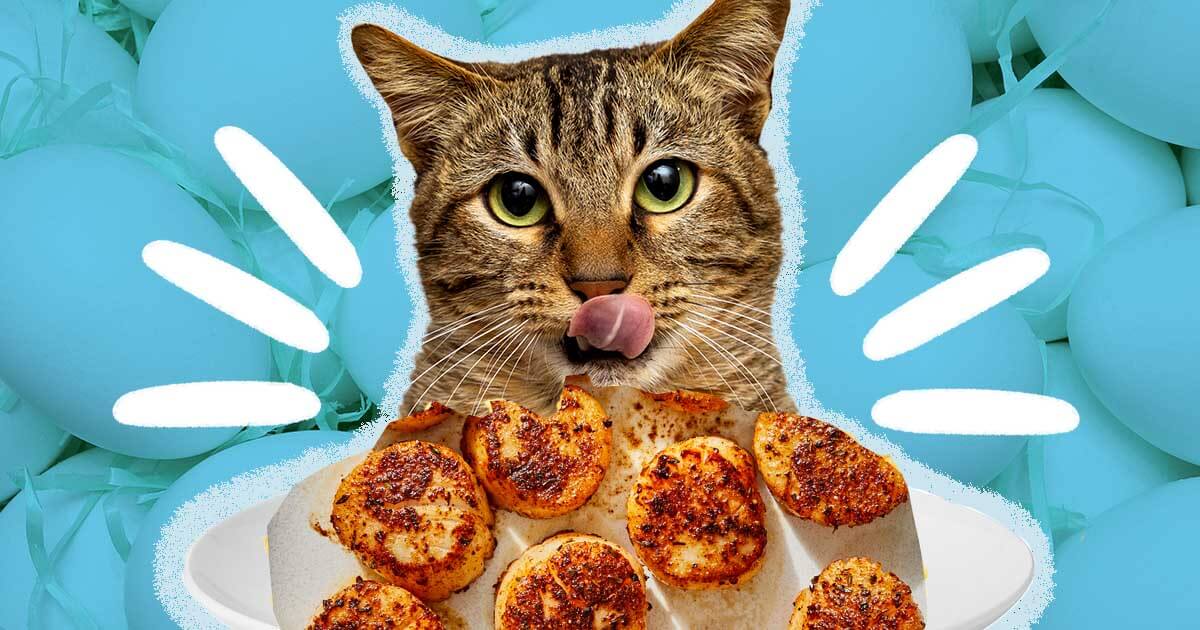If scallops are one of your favorite foods, then you must be thinking about providing this to your cat too. That’s why one of the most-asked questions in the pet forums is, can cats eat scallops?”
Well, the short answer is “YES.” Cats can eat scallops. However, they should be provided with cooked scallops because raw ones might be harmful to them.
To know more about feeding scallops to your feline, just go through the article till the very end. So, let’s get started!
Leconchef Pet Hair Dryer Box for Pet Grooming, Fast Drying, Adjustable Temperature and Time

Can Cats Eat Scallops? (Explained)
If cooked properly, scallops are non-toxic and safe for cats to eat. You can feel good about giving your cat scallops because they are a healthy and nourishing food option.
Cats can enjoy these low-fat, high-protein foods. But, since they already get everything in their regular diet, giving scallops to them occasionally or as a treat is the best way.
Besides protein and healthy fats, you can also find omega-3 fatty acids in abundance in them.
You can occasionally feed your cat scallops because they are rich in many minerals and vitamins, including potassium, zinc, magnesium, iron, vitamin B12, selenium, copper, choline, phosphorus, and iodine. Cooked scallops are a good source of these nutrients, which are vital for a cat’s health.
However, it is important to keep in mind and check that the cooked scallops do not contain any added substances or preservatives like garlic, tomatoes, onions, salt, or sauce. Because these are considered extremely hazardous for a feline if given in large amounts and if the daily intake value is exceeded.
Avoid feeding your cats raw scallops because they can contain salmonella, which can be fatal to cats. Plus, having accumulated heavy metals like cadmium, arsenic, mercury, or lead, scallops caught in polluted waters can also pose a great threat to a cat’s health. It also contains the food-borne illness-causing enzyme thiaminase.
Since scallops are typically found in the ocean, it is important to ensure that they are properly cleaned. Also, consider checking if they are still raw. If they are, a cat’s sensitive digestive system could be fatally harmed by the bacteria present in raw scallops.
Last but not least, there is a potential for an allergic reaction. If you know or suspect that your cat has ever had an allergic reaction to seafood, it will be best to steer clear of scallops altogether.
If you are unsure, it is best to start with a small amount and observe how your cat reacts to the new food before increasing the amount.
Cat Window Hammock Window Perch, Safety Cat Shelves Space

What if my cat consumes too many scallops?
Well, if your cat eats too many scallops, she can get sick. If you don’t want her to vomit or get diarrhea, do not take this as a simple problem.
Also, ask your vet if she’s allergic to seafood. They will let you know if your pet has to avoid them. If your cat becomes dizzy or suffers from rashes after eating scallops, take her to the vet immediately.
How much time does it take for scallops to boil?
Scallops are very easy to cook. They only need about 4-5 minutes in the oven to boil, and then you’re done!
Benefits ✅
Scallops can be one of the best treats that you can give to your feline. Because it has so many health benefits, it can be an ideal treat for your cat. Moreover, scallops are also tasty to eat for both humans and felines.
Here are the health benefits that your cat can get if they eat scallops:
- They have a good amount of protein, which is a major requirement for felines.
- Vitamins present in scallops help to improve their digestive system
- Scallops can help with the cognitive system of cats and keep them healthy
- As they have omega-3 fatty acids, they can help felines with allergies.
- Scallops have a good amount of potassium, which can help cats who lack potassium.
Risks ❌
As a cat owner, you are obliged to take care of matters that might be harmful to your feline friends. Though scallops are very useful for cats, they also have some risks.
Here are some drawbacks to feeding scallops to your cats:
- If they are allergic to cats then they can cause diarrhea, itching, redness, hair loss, vomiting, and lethargy.
- If not well cooked, it can be dangerous to cats as it contains the food-borne illness-causing enzyme thiaminase
- Can cause obesity
- It contains salmonella, which can be fatal to cats.
ORSDA Cat Toys 2in1 Interactive Cat Toys for Indoor Cats

Servings 🍽️
You should not give your cat scallops more frequently than once or twice per week. Even though they are high in nutrients, these foods are not the best choice for your cat. As there are other options available that include all of the essential nutrients for your cat’s health, you can try them also.
You can fill your cats’ nutritional hunger with just a few small pieces of scallops. Keep in mind that cats are significantly smaller than people, and as a result, their calorie requirements are significantly lower.
A single scallop has approximately 35 calories, which is equivalent to 10% or more of the daily caloric requirement for most cats.
Furthermore, they have small intestines and a reduced capacity for swallowing, so giving a huge chunk of scallop could potentially be harmful for them.
Wrapping Up
Well, that’s all there’s to it, people. Now that you’ve got a clear understanding of this question, can cats eat scallops?
To wrap it all up, yes, you can feed your cat scallops in small amounts as a treat, but remember that you should check if your cat has an allergy to it or not. The most important thing is to make sure it is cooked thoroughly.
Thank you so much for dropping in today. You guys are the bee’s knees!!!



Reading your article helped me a lot and I agree with you. But I still have some doubts, can you clarify for me? I’ll keep an eye out for your answers.